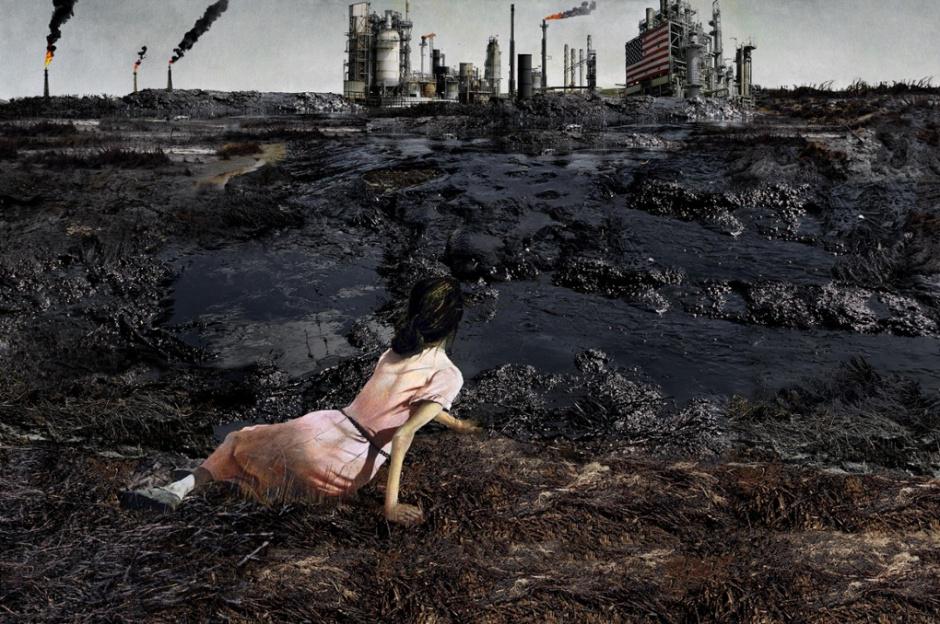Divestment from fossil fuels, coal, shell etc. is experiencing more interest and is driving more and more initiatives. It seems to make sense, you divest from shares of Shell, this means the stock price drops, operation of Shell becomes less liquid and so it’s exploration will slow down. Maybe it even has to shut down parts of it alltogether.

These people could have other less destructive jobs
The approach is to be supported primarily because it sends a signal about the companies invloved, they are not to be respected, the need to shut down, and a public divestment campaign will make the public aware and possibly share the sentiment. To actually shut them down such actions have little effect. If there are no high profile investors, there will always be invisible, anonymous investors, why? Because most oil/gas/coal companies support the existence of the wider economy.

Thinking of oil/coal and gas companies like Shell, BP, Exxon as profit making businesses is common, but does not allow us to understand them completely. The money an oil company gets for one barrel of oil does not depend on the effort it took to produce it. We can clearly see that because the price rises and falls. It can depend on that, but only once producing oil has become very hard, and then the price still can’t explode, instead some will no longer be asked/have access to buy it.

neat people at the ‘helm’
The price of oil/coal and gas is for the most part a function of its importance in the wider economy. It is hard to explain this clearly because most people can’t think of the economy in terms of material flows, so oil, wood, steel, gas, soj etc. They think in terms of money flow, which says nothing about the amount and location of any resource. We will work on a story that immediatly shows how weak most people’s understanding is, or how paradoxical our economy.
We can say : As long as people use oil (or any other fossil fuel), it will be offered, and as long as it is offered and used, it will be affordable at least to some. To offer oil you need oil, not money. You can buy steel with oil, you can trade steel for cash, you can get food for cash, you can run your drill with oil, you can run your rig with oil, you can get planes in return for kerosine, you can fly them with oil etc. etc. An oil company does NOT need money. This is the most important thing to understand. As long as Shell has oil reserves it can direct itself (and for that it also gets a lot of subsidies, so they are liquid), it is independent and can do what it wants.
This is the reason why divestment doesn’t work. Investment also doesn’t work. Shell and most oil, coal and gas companies that have their own reserves are independent of whatever happens in the financial markets. What they operate on is their OWN preference for certain countries and communities, as well as the ability of these countries to protect their interests. Shell has been shown to pick and choose members of government so that its interests be served, and once enough members of government are pro-shell, which is also pro-economics it becomes impossible to repopulate it with people that think about alternatives to oil/coal and gas, at least in the ruling parties.
So divestment doesn’t work. Oil/gas and coal companies may act as if it does work just to make sure we keep believing in it. But what does work?
We would say poaching. Poaching is the buying out of key employees from a business, usually to staff the competition. Head hunters do it, big IT firms like Apple and Google have (illegal) anti-poaching agreements. Poaching is effective because it means you don’t have the right guy/gall with the right expertise to do the job. You can build an oil rig, but you have to move it to the right place and drilling for oil/gas is not easy, it requires smart allert intelligent people. It also requires a lot of easy going, strong loyal workers.
The word loyal defines a company like Shell. Shell workers are loyal, they are perhaps selected exactly on that trait, why? Because it is not enough to work for any company, they need to work for Shell. To support that Shell gives a lot back, it also gives Shell white collar workers the high life as an expat. Banks do that too. It is all to protect themselves from people moving out of the industry, it also helps companies like Shell to be protected by an aura of neatness, kind politeness, the style and culture of the visible part of their workforce. That is perhaps the hardest Shell to break through : A neat, kind, well to do person is almost automatically respected. How can you say something bad about a company of neat people?
Another way to capture workers is the prospect of a carreer. The first carreer humans where offered in the west was to go to heaven, and this has proved to be extremely effective in getting them to work hard and be decent. In companies a carreer means workers invest efforts in to some goal they can attain, and this not wanting to lose what they invested locks them into their path as well. The white collar workers in Shell are selected for sensitivity to status, cars, big houses, wanting a life. (Blue collar workers practically have no life).
But back to poaching. A lot of work done in the oil/gas/coal industry has similar cousins in the renewables sector. Wind turbines require off shore expertise, steel work, heavy logistics. One could imagine to poach welders towards the Wind offshore sector. The only thing needed is a slight pay rise. The wind sector is growing at breakneck speed so the demand for welders is growing. Get them where it hurts the competition! Mining coal is harder to shut down by buying out the workers, and there are always other workers to take the place of the people you buy out, but higher up in the operational food chain there may be opportunities. Coal is sensitive to competition from gas, nuclear, oil, and biomass producers, who are eager to pounce on it because its fuel has the highest carbon content (all others also contain hydrogen).
For sure oil drill workers and gas installation workers can be bought out and this will impede those type of operations. It means for instance a person able to run a drilling operation will be offered a guaranteed income for x years if he leaves the industry. If he finds a job elsewhere he will get extra money so his income is as promised.
Poaching can kill an operation in its tracks, it is much more efficient that divesting, which is like leaving a restaurant on a bussy street. It’s not a nice guesture, but there will be other clients. Buying out the cook of a top restaurant can make it shut its doors for good.
So if you divest from coal/gas/oil, then invest in offshore wind, solar organic farming, so when your funds are used to buy fossil fuels, it is at least to build or manage a green operation. If you for instance invest in a building company you will cause massive emissions from concrete pouring, heavy logistics, shipping etc. If you invest in a chemical company you may be responsible for the use of oil to make plastics or pesticides that never break down once they end up in nature.
Perhaps a fund that poaches (re-employs) workers from the coal/gas/oil/nuclear sectors and shorts the stocks is a succes formula : On the one hand you can send a press release “Essential Shell engineer resigns, halting arctic drilling” on the other hand you can cash in on the slide in Shell shares as that news hits the markets
P.S. Another thing that will work is to not let the neat people think they are neat. The problem is really that if an elite that can separate themselves from the wider society is in charge, the rest of society can live in a tarred wasteland, these people won’t notice because they are only interested in their own lives. So no compounds, no enclaves, so these people who are selected for their singular self interest (and interest in their family) are exposed to the damage they do.
